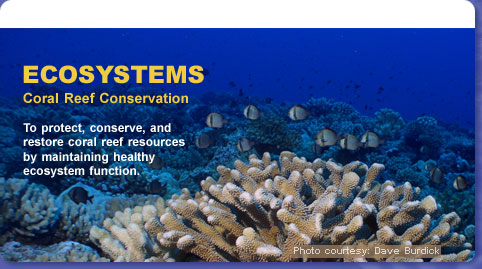









NOAA - Ecosystem Goal Team - To protect, restore and manage the use of coastal and ocean resources through an ecosystem approach to management
Ecosystem Observations
Program Mission
NOAA's Ecosystem Observations Program (EOP) provides trusted scientific information to foster healthy marine ecosystems for current and future generations.
The name EOP can be misleading. While ecological observations make up the foundation of much of EOP’s work, they are only the initial step in the myriad of responsibilities and accomplishments within the program. EOP provides extensive data collection through NOAA monitoring and observing activities throughout the world’s oceans. These data allow EOP and its partners the ability to monitor, assess and forecast the status and trends in and around diverse marine ecosystems that affect our economy, our environment and our culture.
Ecosystem Approaches to Management
To achieve balance among ecological, environmental, and societal interests, the EOP has adopted an Ecosystem Approach to Management (EAM). An EAM ensures that the management of marine resources is based on the “entire ecosystem” instead of the commonly used practice of managing one activity or one part of an ecosystem without considering the impacts on and influence of other parts. EOP works within its five areas of expertise, or "capabilities". Each capability provides EOP with specific data that directly support EAM. EOP Capabilities are Fisheries Monitoring and Assessment, Protected Species Monitoring and Assessment, Ecosystem Monitoring, Assessments and Forecasting, Economic and Sociocultural Monitoring and Assessments and Data Management, Technology Transfer, Education, and Outreach.
EOP develops assessments and forecasts to provide researchers and managers with the best scientific information available for resource management decisions. EOP also provides economic and socio-cultural assessments enabling resource managers to assess impacts of resource management decisions and to better respond to community needs. EOP observation data, assessments and forecasts provide NOAA and its external partners vital information to make sound management decisions based on knowledge of current status and trends of living marine resources. EOP observations, assessments, and forecasts from those data provide the underlying science needed to take a holistic approach in managing our oceans and coasts.
Current major programs within EOP include expanding stock assessments to help set annual catch limits (ACLs) by 2010 to meet the mandates of the Magnuson Stevens Fisheries Conservation and Management Act and to support protected species management; the development of Integrated Ecosystem Assessments (IEAs) to support EAM; and creating information management architecture to ensure access to, and quality control of data streams used in assessments and forecasts.
EOP has several sub-capabilities and cross-Line Office partners to help support these major programs. EOP is the home of the Cooperative Research program which provides local fishermen, scientists and resource managers the opportunity to develop local-solutions to fishery concerns impacting them. The Fisheries Statistics program summarizes U.S. commercial fisheries landings and provides fisheries-dependent information through recreational fisheries surveys nationwide. The National Observers Program deploys fishery observers to collect catch and bycatch data from US commercial fishing and processing vessels. The National Data Development Center is a leader in Regional Ecosystem Data Management (REDM) and ensures that usable data for IEAs are available to scientists via a web-based portal. Mussel Watch, a program of the Center for Coastal Monitoring and Assessments is the longest continuous, nationwide contaminant monitoring program in U.S. coastal waters. EOP also supports Fisheries Oceanography Coordinated Investigations (FOCI) a joint research program between the Alaska Fisheries Science Center (AFSC) and the Pacific Marine Environmental Laboratory (PMEL) that determining the influence of the physical environment on marine populations and the subsequent impact on fisheries.
EOP is more than just observations. It is a coordinate group of scientists, specialists, and external partners contributing world-class expertise in oceanography, marine ecology, marine archeology, fisheries management, conservation biology, natural resource management, aquaculture, and environmental risk assessment.
Ecosystem Programs |
||
 |
 |
 |
 |
 |
 |
 |
 |
 |
Acting Program
Manager:
Ned Cyr
Ned.Cyr@noaa.gov
Program Coordinator:
Eric Breuer
Eric.Breuer@noaa.gov
Website:
Ecosystem Observations Program

